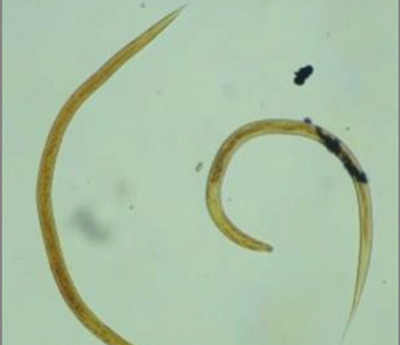Biological control of nematodes by nematode-trapping fungi Duddingtonia flagrans in naturally infected sheep in southern Brazil
Authors: Luciane Holsback, Heloísa E. Lima, Petrônio P. Porto, Ellen de-S. Marquez, Franciele G. d-S. Zacarias and Emília de-P. Porto
Ger. J. Vet. Res
2021.
vol. 1, Iss. 2
pp:17-26
Doi: https://doi.org/10.51585/gjvr.2021.2.0010

Abstract:
The aim of this study was to evaluate the anti-helminthic effect of a commercial formulation Bioverm® (Duddingtonia flagrant) in 28 sheep naturally infected with gastrointestinal nematodes. Animals were classified into two groups: group 1 (G1, n=14) treated with nematophagous fungi and group 2 (G2, n=14) untreated control. The efficacy of the anti-helminthic drug was assessed based on the egg count per gram of feces (EPG) of strongyles, larval culture, hemogram, leukogram, plasma protein levels, animal body weight, and anemia using FAMACHA© at days 0, 30, 60, 90, 120, 150, and 180. Additionally, the nematode larvae were quantified in the dry matter of the pastures of both groups. Results showed that the EPG was significantly decreased in animals receiving nematophagous fungi from D30 until the end of the experiment. The most common nematode genus was Haemonchus (63%), followed by Cooperia (23%) and Trichostrongylus (15%). Based on the fecal egg count reduction test (FECRT), treated animals showed a reduction in fecal egg count of 58.9%, 8.6%, 92.8%, 96.4%, and 96.2% at D30, D60, D90, D120, and D180, respectively. The absolute values of red blood cells and leukocyte counts were significantly increased at D60 and D90, respectively. A significant weight gain was observed in the treated ewes at the end of the experiment; however, there was no correlation between the EPG values and hematocrit with the FAMACHA© degrees of animals in both experimental groups. The mean EPG of both groups and the number of infectious larvae in the pastures were not directly proportional. In conclusion, nematophagous fungi contributed to decreased parasitic load in sheep and, consequently, improved animal performance; they can be a suitable alternative to reduce problems associated with nematode infections.
Keywords:
Duddingtonia flagrans, Small ruminants, Gastrointestinal parasites, Pasture
Statistics:
Article Views: 2456
PDF Download: 65